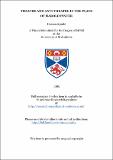Files in this item
Theatre and anti-theatre in the plays of Harold Pinter
Item metadata
| dc.contributor.advisor | Parry, P. H. | |
| dc.contributor.author | Ayoubi, Hassan | |
| dc.coverage.spatial | 336 p. | en_US |
| dc.date.accessioned | 2018-07-10T09:49:13Z | |
| dc.date.available | 2018-07-10T09:49:13Z | |
| dc.date.issued | 1985-07 | |
| dc.identifier.uri | https://hdl.handle.net/10023/15164 | |
| dc.description.abstract | This is an analytical study of Harold Pinter's drama in the light of its reconciliation of elements culled from the symbolic anti-theatre movements that have flourished on the continent (especially in France) and elements from the British tradition of realistic drama. This reconciliation has added new forms of expression to the English theatre but has often prevented the playwright from adding new depths to either the symbolic or the realist trends. The first part of this thesis sets out the general characteristics of both trends. A brief survey of the works of Mallarme, Maeterlinek, Jarry, the Futurists, the Dadaists and the Surrealists is offered to show the development of certain negative currents in the theatre that rejected much that was taken for granted in traditional Western culture and formulated a convention that strongly negated the traditional norms of the theatre. Some emphasis is laid on the later developments of this trend as seen in the works of Eugene Ionesco, Peter Handke and especially Samuel Beckett, who is taken as an exemplar of anti-theatre. As a contrast to this trend, the ''plays of character" of Noel Coward and Terence Rattigan are studied as representative of the popular tradition in British drama. In the second part an analysis of the advantages and disadvantages of Pinter's blending of the two trends is carried out on his play. His early works are represented by The Birthday Party, The Caretaker, The Homecoming and Old Times, which stand for different stages in the development of his art. Emphasis is also laid on his late works: No Man's Land, Betrayal, Monologue, other Places, the sketch Precisely and the recent short play One for the Road. This study shows that anti-theatre is only a theatrical convention in Pinter's work and that his art is deeply rooted in tradition. As a result of the duality in his art, the vision he culls from anti-theatre is blurred by his realistic depiction, while this depiction itself lacks the social, psychological and moral values inherent in the realistic tradition. However, in a number of plays Pinter succeeds in exploiting the experimental forms of anti-theatre for depicting effective realistic situations and he has recently shown greater interest in the clarity of realism. | en_US |
| dc.language.iso | en | en_US |
| dc.publisher | University of St Andrews | |
| dc.subject.lcc | PR6066.I53Z5A9 | |
| dc.subject.lcsh | Pinter, Harold, 1930-2008 | en |
| dc.subject.lcsh | Anti-theatre | en |
| dc.title | Theatre and anti-theatre in the plays of Harold Pinter | en_US |
| dc.type | Thesis | en_US |
| dc.contributor.sponsor | Jāmiʻah al-Lubnānīyah | en_US |
| dc.contributor.sponsor | University of St Andrews | en_US |
| dc.publisher.institution | The University of St Andrews | en_US |
This item appears in the following Collection(s)
Items in the St Andrews Research Repository are protected by copyright, with all rights reserved, unless otherwise indicated.

